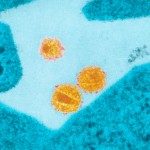Link to Pubmed [PMID] – 32128419
Link to DOI – 10.1126/sciadv.aaz0374
Sci Adv 2020 02; 6(8): eaaz0374
Mucosal-associated invariant T (MAIT) cells in HIV-1-infected individuals are functionally impaired by poorly understood mechanisms. Single-cell transcriptional and surface protein analyses revealed that peripheral MAIT cells from HIV-1-infected subjects were highly activated with the up-regulation of interferon (IFN)-stimulated genes as compared to healthy individuals. Sustained IFN-α treatment suppressed MAIT cell responses to Escherichia coli by triggering high-level interleukin-10 (IL-10) production by monocytes, which subsequently inhibited the secretion of IL-12, a crucial costimulatory cytokine for MAIT cell activation. Blocking IFN-α or IL-10 receptors prevented MAIT cell dysfunction induced by HIV-1 exposure in vitro. Moreover, blocking the IL-10 receptor significantly improved anti-Mycobacterium tuberculosis responses of MAIT cells from HIV-1-infected patients. Our findings demonstrate the central role of the IFN-I/IL-10 axis in MAIT cell dysfunction during HIV-1 infection, which has implications for the development of anti-IFN-I/IL-10 strategies against bacterial coinfections in HIV-1-infected patients.

